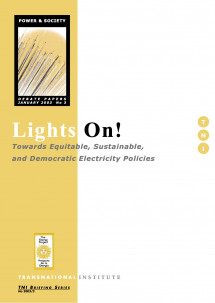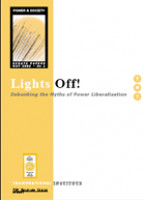Lights On! Towards Equitable, Sustainable, and Democratic Electricity Policies
The underlying assumption of power liberalisation is that the private sector and competitive market mechanisms are more effective and efficient than regulated monopoly regimes. The experience of the last few years, however, proves that it is hard to create a truly competitive market in the electricity sector. Power liberalisation tends to simply replace regulated public monopoly with unregulated private oligarchy. The major ramification is that the whole electricity sector could be turned into a profit-generating machine for private interests at serious public cost. It puts the world's poor, who cannot afford to pay high prices for electricity, in greater danger of being permanently unconnected or practically disconnected. The manipulation of the electricity system for greater profit can also cause serious instability in electricity systems, at the risk of throwing the whole society in disarray.

Descargas
Autores
Moreover, there is growing evidence that power liberalisation is bad for the environment. Workers, consumers and some environmentalists are now fighting power liberalisation around the world. An emerging issue in this struggle is the alternatives to power liberalisation. In other words, what we should fight for. This edition of the TNI briefing series is dedicated to this question. It is the hope that this paper can be used as a conceptual map as well as a practical guide for everybody striving to redefine the path for power sector reform based on the principles of social justice and environmental sustainability.
